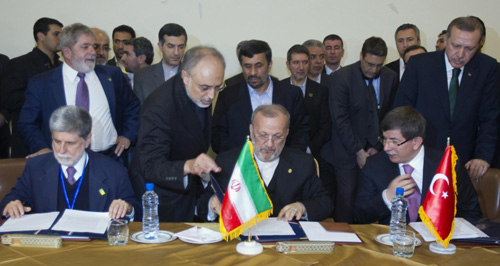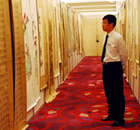Global General
Iran to ship uranium to Turkey in nuclear deal
(Agencies)
Updated: 2010-05-17 16:23
 |
Large Medium Small |

TEHRAN– Iran agreed Monday to ship most of its enriched uranium to Turkey in a nuclear fuel swap deal that could ease the international standoff over the country's disputed nuclear program, just as pressure mounts for tougher sanctions.
The deal was reached in talks with Brazil and Turkey, elevating a new group of mediators for the first time in the dispute over Iran's nuclear activities. There was no immediate comment from the United States and the other world powers that have led earlier negotiations as to whether the new deal would satisfy them and stave off a fourth round of UN sanctions.
|
||||
"It was agreed during the trilateral meeting of Iranian, Turkish and Brazilian leaders that Turkey will be the venue for swapping" Iran's stocks of enriched uranium for fuel rods, Foreign Ministry spokesman Ramin Mehmanparast said on state TV Monday.
Iran has previously issued positive signals about possible nuclear deals only to back off later in apparent diplomatic stalling tactics.
The deal would deprive Iran - at least temporarily - of the stocks of enriched uranium that it could process to the higher levels of enrichment needed in weapons production. The material returned to Iran in the form of fuel rods cannot be processed beyond its lower, safer levels. Iran needs the fuel rods to power an aging medical research reactor in Tehran that produces isotopes for cancer treatment.
The deal goes to the heart of international concern over Tehran's nuclear activities. Earlier negotiations led by Germany and the five permanent UN Security Council members - the US, Britain, France, Russia and China - have sought to stop Iran from enriching uranium altogether, and thereby deprive it of a possible pathway to nuclear weapons.
Monday's deal was announced after talks between Brazil's president, Luiz Inacio Lula da Silva, Turkish Prime Minister Recep Tayyip Erdogan and Iranian President Mahmoud Ahmadinejad in Tehran.
Iranian Vice President Ali Akbar Salehi, who is also the head of the Atomic Energy Organization of Iran, called Monday's deal historic.
Turkish Foreign Minister Ahmet Davutoglu said the deal meant "there is no longer any need for UN sanctions," Turkey's private NTV television quoted the minister as telling reporters in Iran.










